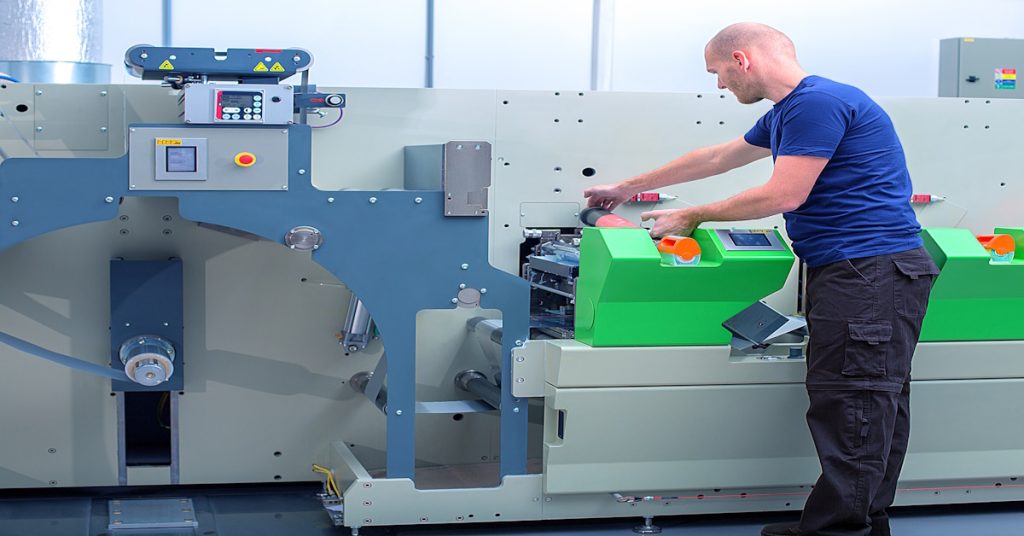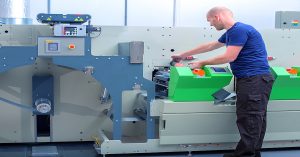In the breakneck speed of today’s technological revolution, a crisis lurks in the shadows of the pressure sensitive labels and flexible packaging industry. Unseen but deeply felt, the industry is grappling the critical shortage which has become known as the skilled Flexo Press Operators crisis.
As the invisible linchpins of print media, they are the unseen heroes, the silent orchestrators, whose scarcity now threatens to stall the robust engine of this sector. The demand for their specialized skills is skyrocketing, wildly surpassing the supply, sending an undercurrent of concern rippling through industry.
The pressure-sensitive labels and flexible packaging industry is currently grappling with an alarming scarcity of skilled flexo press operators across North America. This shortage has profound implications for this industry, which heavily depends on these skilled blue-collar workers for their day-to-day operations. This article explores the root causes of this issue, its potential ramifications, and the potential solutions that could alleviate the problem. Read more (needs hyperlink)
Understanding the Problem
A Flexo press operator is responsible for setting up, operating, and maintaining flexographic printing presses. Unfortunately, there is a significant shortage of these skilled workers in North America. Despite the increasing number of job openings, there aren’t enough experienced flexo press operators to fill these positions. This shortage is not only affecting the operational efficiency of companies but is also posing a significant threat to the overall growth of the flexographic printing industry.
 The Underlying Causes
The Underlying Causes
The Retirement Wave
One of the major contributors to the shortage of experienced flexo press operators is the retirement of the baby boomer generation. This generation, born between 1946 and 1964, constitutes a significant portion of the workforce in various industries, including flexographic printing. As these individuals retire, they leave behind a considerable gap in the labor market that is difficult to fill.
The Declining Birthrate
Another factor contributing to the labor shortage is the declining birthrate in the US. The current birth rate is the lowest it has been in almost 100 years, which means fewer people are entering the workforce. This creates a significant imbalance in the labor market, with more job openings than available workers.
Lack of Training and Education
There is also a noticeable lack of adequate education and training programs for aspiring flexo press operators. Most vocational and trade schools do not offer specialized training programs for flexographic printing, which leaves a void in the industry. Without the necessary training and certifications, individuals are less likely to pursue careers as flexo press operators.
The Attractiveness of Other Industries
The manufacturing sector, which includes flexographic printing, often struggles to compete with other industries in terms of wages and benefits. With companies in other sectors offering higher salaries and more attractive benefits packages, individuals are more likely to pursue careers outside of manufacturing.
Alleviating the Shortage: Potential Solutions
Fostering Education and Training
One of the most effective ways to address the flexo press operators crisis is to foster education and training. More trade and vocational schools should be encouraged to offer training programs and certifications in flexographic printing. These programs should be designed to equip students with the necessary skills and knowledge to operate flexographic presses efficiently. There are so many P/S labels and flexible packaging companies within each region of the United States. As a group, they should form regional alliances to approach their elected state and federal representatives to push for more vocational and certified training as surely each graduate would become one or more of your employees.
Enhancing Wages and Benefits
To make the flexographic printing industry more attractive to potential flexo press operators (workers/employees), companies should consider enhancing their wages and benefits packages. By offering competitive salaries and comprehensive benefits, companies can attract more skilled and experienced workers to their ranks. One item consistently missing is production incentives in the form of bonuses.
Leveraging Technology: Automation and Robotics
With advancements in technology, many industries are turning to automation and robotics as potential solutions to labor shortages. In the flexographic printing industry, automation could potentially replace certain roles traditionally performed by humans.
However, while automation can increase efficiency and productivity, it cannot entirely replace or address the flexo press operators crisis. These operators play a crucial role in overseeing the operation of the presses, troubleshooting issues, and ensuring the quality of the printed labels and flexible packaging materials. Therefore, while automation can supplement the workforce, it cannot eliminate the need for human operators.
Conclusion
The shortage of experienced flexo press operators in North America is a pressing issue that requires urgent attention. By fostering education and training, enhancing wages and benefits, and leveraging technology, industry can begin to alleviate this shortage. However, these measures require a concerted effort from all stakeholders, including educational institutions, industry players, and government bodies. Only then can the industry hope to attract and retain the skilled workforce it needs to thrive in the future.
Without them, the dynamic dance of labels and flexible packaging media could spiral into a frozen standstill. The Flexo Press Operator crisis is real, it’s here, and it’s a challenge we must face head-on. Let’s start the conversation, let’s bridge the gap. Will you join us? #FlexoPress #PressureSensitiveLabels #FlexiblePackaging









